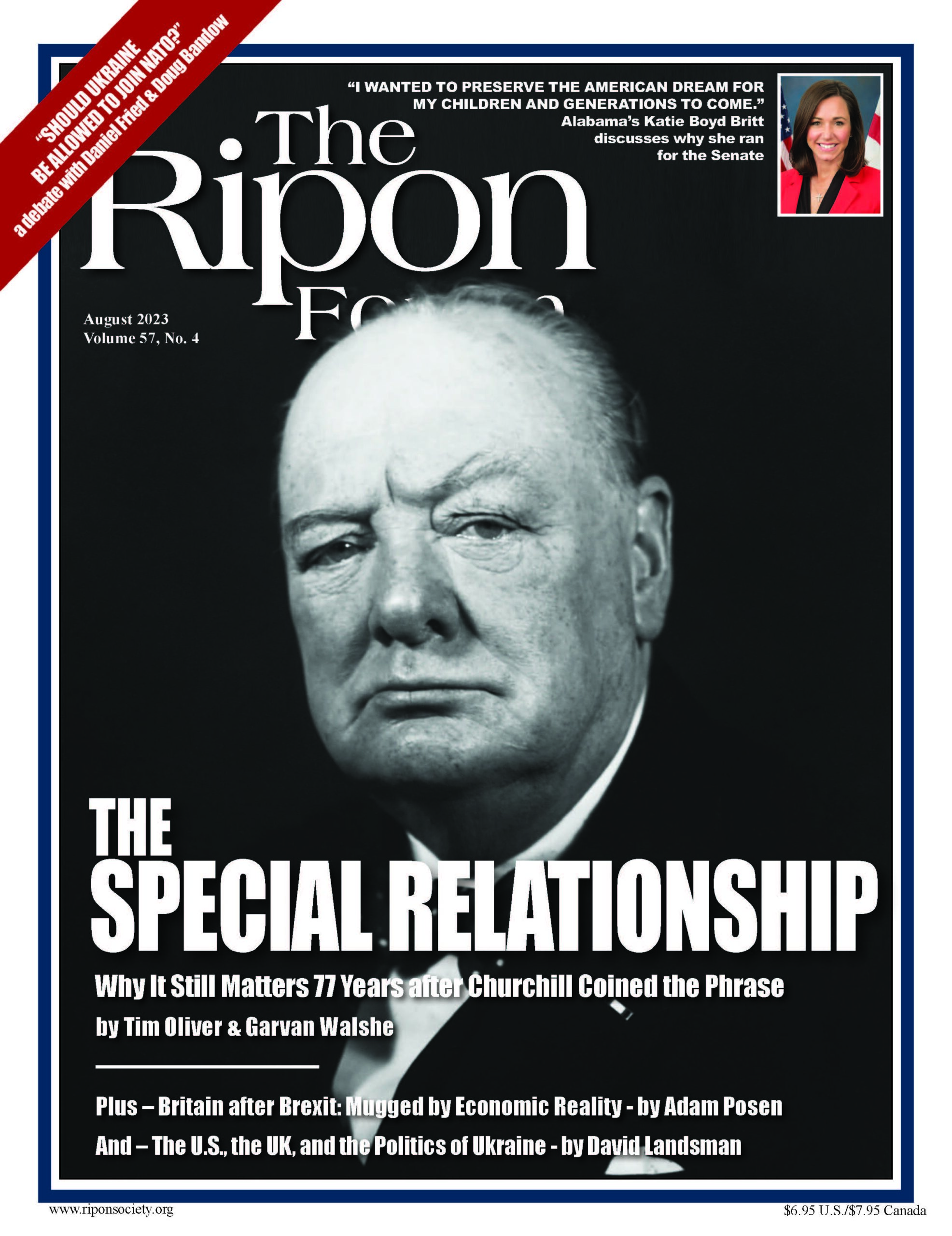Latest Ripon Forum examines why it still matters 77 years after Churchill coined the phrase

WASHINGTON, DC —In a summer that saw Britain’s Prime Minister visit the White House and America’s President visit 10 Downing Street just over one month later, the latest edition of The Ripon Forum examines the Special Relationship between the United States and the United Kingdom and its renewed importance in an increasingly volatile world.
Leading the Forum’s coverage are two astute observers of the UK political scene. Tim Oliver is Director of Studies for the Institute for Diplomacy and International Governance at Loughborough University in London, while Garvan Walshe heads up communications for the European Policy Centre in Brussels and is a former policy advisor to the British Conservative Party.
In their lead essay, the pair examine why the Special Relationship still matters 77 years after Winston Churchill coined the phrase. They also lay out “six highly unlikely things” that would have to happen for the partnership between both countries to end. “The term is Churchill’s,” Oliver and Walshe write, “yet the rhetoric is underpinned by a culture of practical cooperation that the U.S. does not have with any other ally. Countries like France may share the UK’s skills, or Canada its geopolitical world view, but no single other country has both.
“This shared outlook and cultural fit mean that for the Special Relationship to end, six highly unlikely things would have to happen: the UK would decommission its nuclear weapons and submarines; London would give up having a global intelligence service; the British military would abandon efforts to align key capabilities with those in the USA; Churchill’s grip on Britain’s worldview would fade; the English speaking world would no longer be the focus of so much in British politics and society; and the security and stability of Europe would not be in doubt.”
In another essay, Adam Posen, the President of the Peterson Institute for International Economics, takes an in-depth look at the impact that Brexit has had on the UK economy. Posen — who was honored by Queen Elizabeth in 2014 for his services to British economic policy — finds that leaving the European Union has not proven to be the economic boon that Brexit’s supporters had pledged it would be. “There is clear evidence that post-Brexit Britain does look different from its peers, Posen writes, adding that: “Its trade and private investment has recovered less from Covid-19 than other high-income economies, its labor mismatch problem has been more severe and lasting than that of the U.S., and its productivity growth has persistently lagged behind its peers.”
Tori Smith of the American Action Forum examines another aspect of U.S.-UK economic policy — trade — and finds that while rhetoric by the leaders of both nations to strengthen trade relations has been positive, real progress will not occur without some bold moves, which she lays out, as well. “The United States should be looking to import more from the UK than it did pre-pandemic,” Smith writes, “especially as the Administration seeks to diversify supply chains out of China.”
At a time when the war in Ukraine has galvanized the Western alliance, veteran British diplomat David Landsman examines the politics of the issue, the levels of military commitment, and whether public support is likely to continue if the conflict persists. Observing that “Ukraine has reaffirmed the salience” of the Special Relationship, Landsman writes: “Much can be understood from two key politico-military ratios. The U.S. and UK are the two largest providers of military assistance to Ukraine. But the gap between the U.S. commitment (around $38 billion) and the UK’s ($5.9 billion) is also highly significant. Taking a snapshot today, far more unites the two countries than divides them.”
In two other essays focusing on another global challenge both the U.S. and UK face, Matt Brazil of the Jamestown Foundation writes about the “Dawn of the Not-So-Golden Era of UK-China Relations,” and Lisa Curtis of the Center for a New American Security examines the importance of AUKUS — the new military alliance between the U.S., UK, and Australia — and why it will be so critical to Indo-Pacific security in the years ahead.
In another essay, Ripon Society fellows Danielle Wagner and Fynn Haagen provide a “Brief History of The Special Relationship.”
In the latest debate, former U.S. Ambassador to Poland Daniel Fried and the Cato Institute’s Doug Bandow square off over the question of whether Ukraine should be allowed to join NATO.
And in the latest Ripon Profile, first-term Senator Katie Boyd Britt of Alabama discusses her new job on Capitol Hill and what Republicans should do to reclaim their majority in the Senate next year.
The Ripon Forum is published six times a year by The Ripon Society, a public policy organization that was founded in 1962 and takes its name from the town where the Republican Party was born in 1854 – Ripon, Wisconsin. One of the main goals of The Ripon Society is to promote the ideas and principles that have made America great and contributed to the GOP’s success. These ideas include keeping our nation secure, keeping taxes low and having a federal government that is smaller, smarter and more accountable to the people.



